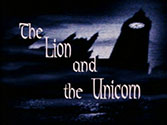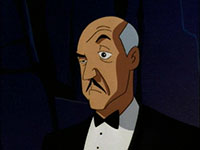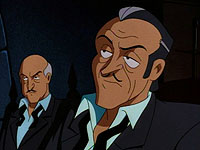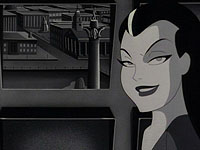|
||
|
| Credits | Cast | |
Written by Diane Duane, Philip Morwood & Steve Perry Directed by Boyd Kirkland Music by Brian Langsbad Animation by Dong Yang |
Kevin Conroy as Bruce Wayne Loren Lester as Dick Grayson Efrem Zimbalist Jr. as Alfred Kate Mulgrew as Red Claw Adam Ant as Bert |
Roy Dotrice as Frederick Richard Doyle as Ernie Kenneth Mars as M2 Hal Rayle as Cameraman B. J. Ward as M3 |
|
The fact is rarely remarked, for the Bruce-Alfred relationship is one of the rare places in the Batman universe that the true and unsullied silver of human nobility shines through. The keepers of the mythos deliberately try to keep its characters and their universe as tarnished as possible, and insofar as Bruce Wayne's psychology gets explored it is shown to be a grim and unappealing place. And since Alfred is probably the only character who keeps Wayne from drifting away into the arctic sea of pure nihilism, they generally shunt him aside as the funny little man who keeps Wayne Manor on an even keel even as its master and owner is listing heavily to starboard. This, after all, is what the character was initially designed to do. Bruce Wayne is the billionaire owner of a large estate and even larger corporate empire. This would be enough to keep most people busy, but Wayne also has his Bat-life to distract him. If he had only himself to keep himself company in that huge mansion it would quickly become a ghost-rattled mausoleum, with Wayne as the chief ghost. Though it is scarcely credible that Alfred alone keeps that imposing pile shipshape, his mere presence warms and lights the place; he also displays the human face that its owner is all too preoccupied to present himself. Then, too, he serves as a bridge from Wayne's youth to his manhood. An orphaned boy, particularly one in possession of a large fortune, would never have been left to fend for himself. With Alfred as his guardian it become plausible that Wayne should have grown up mostly alone and mostly free to pursue dreams of justice delayed and vengeance undenied. And it is in this role that Alfred served his greatest purpose. Simply put, he saved Bruce's sanity and his humanity.
But we must go further, for it was not merely Alfred's presence that saved Bruce (and continues to save him) but also his sheer humanity. Of all the characters in the Batman universe, Alfred is far and away the least histrionic and the one least impressed with all the adventures. Of course, English servants are famous for their imperturbability, but it's not class and nationality that shines through, but the conviction that all the virtues Batman celebrates and defends must ultimately be built on a human scale. Alfred's insistence that Bruce occasionally get a good night's sleep, or eat a decent meal, or take a vacation, is not the stupid attempt by a harried servant to impose a predictable schedule on an eccentric employer. Nor is it the fussy ministrations of a meddling maiden aunt. It's the lucid appreciation that willpower, however strong and determined, must ultimately be constrained by the limits of the human frame, and that Batman can forget those limitations only at his own peril and the peril of those who rely on him. And this emphasis on physical prudence also has the effect of enforcing a kind of moral prudence: For someone as driven and obsessive as Bruce, moral exhaustion (the weakened ability to make the right kind of judgments and decisions) is as great a risk as physical exhaustion. (More than anything else, after all, it is moral stamina that separates Batman from his adversaries, people whose passions and obsessions have left them morally deranged.) And so in reminding Bruce that he is only a man and so must respect his physical limits, Alfred implicitly also reminds him that he must respect his moral and spiritual limits as well. Alfred's tempering influence on Bruce is probably best seen in contrast with Bruce's influence on his own acolytes. He's taken in orphans himself, victims of equivalent tragedies, and taught them to be crimefighters too. But where Alfred restrains, Wayne goads and bullies Grayson and Drake and Gordon to be more strenuous, more serious, more implacably and inflexibly relentless. And so his influence is ultimately withering—all eventually rebel or meet untimely deaths or accidents. That Batman himself never falls or falters may be due to his immense skill; but it may equally be the presence of that that unobtrusive little man with thepursed lips that deters Bruce from crossing the same line he unforgivingly pushes others over.
Of the two, "The Lion and the Unicorn" does better. For starters, its premise is not as dreadfully silly as that of "Eternal Youth," and it pays Alfred the compliment of giving him an interesting past. But despite its initial attempt to put him in the middle of things, it ends up treating him only as a pawn in someone else's game and does little more than transfer the Bat-franchise to Great Britain. It's a pity that the creative team—which is on record as loving the James Bond series—was unable to do more with the idea than make a pale Thunderball knockoff. |
|
|
|
Related Episodes |
What Others Are Saying ... |
| Back to The Laughing Fish |
Forward to Lock-Up |




